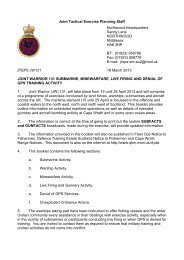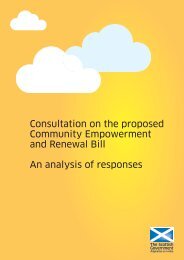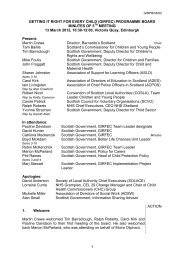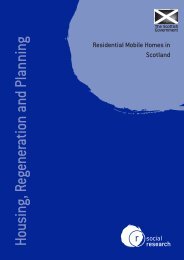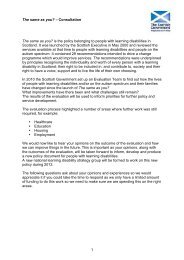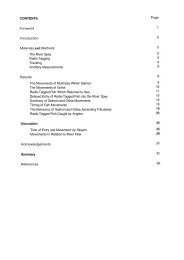Open - Scottish Government
Open - Scottish Government
Open - Scottish Government
You also want an ePaper? Increase the reach of your titles
YUMPU automatically turns print PDFs into web optimized ePapers that Google loves.
Consultation on the <strong>Scottish</strong><br />
<strong>Government</strong>’s Proposals for a<br />
New Tribunal System for<br />
Scotland<br />
British Psychological Society response to<br />
the <strong>Scottish</strong> <strong>Government</strong><br />
June 2012
About the British Psychological Society<br />
The British Psychological Society, incorporated by Royal Charter, is the learned and<br />
professional body for psychologists in the United Kingdom. We are a registered charity with a<br />
total membership of almost 50,000.<br />
Under its Royal Charter, the objective of the British Psychological Society is "to promote the<br />
advancement and diffusion of the knowledge of psychology pure and applied and especially to<br />
promote the efficiency and usefulness of members by setting up a high standard of professional<br />
education and knowledge".<br />
We are committed to providing and disseminating evidence-based expertise and advice,<br />
engaging with policy and decision makers, and promoting the highest standards in learning and<br />
teaching, professional practice and research.<br />
The British Psychological Society is an examining body granting certificates and diplomas in<br />
specialist areas of professional applied psychology.<br />
Publication and Queries<br />
We are content for our response, as well as our name and address, to be made public. We are<br />
also content for the the <strong>Scottish</strong> <strong>Government</strong> to contact us in the future in relation to this<br />
consultation response. Please direct all queries to:-<br />
Consultation Response Team, The British Psychological Society,<br />
48 Princess Road East, Leicester, LE1 7DR.<br />
Email: consult@bps.org.uk Tel: (0116) 252 9508<br />
About this Response<br />
This response was prepared for the British Psychological Society by Dr Gary MacPherson,<br />
CPsychol, CSci, AFBPSS, member of the Division of Clinical Psychology in Scotland (DCP-S),<br />
the Division of Forensic Psychology in Scotland (DFP-S), the Faculty for Children and Young<br />
People in Scotland, and the Faculty of Clinical Heath Psychology (FCHP); and Dr Ruth Stocks,<br />
CPsychol, committee member and commenting on behalf of the DCP-S, member of the<br />
DFP-S, and member of the Leadership and Management Faculty, with contributions from Mark<br />
Ramm, committee member and commenting on behalf of the DCP-S, and member of both the<br />
DFP-S, and the Faculty of Forensic Clinical Psycology.<br />
We hope you find our comments useful.<br />
David J Murphy CPsychol<br />
Chair, Professional Practice Board<br />
Bridget Hanna CPsychol, CSci, AFBPsS<br />
<strong>Scottish</strong> Branch Committee Member<br />
New Tribunal System for Scotland (S)<br />
British Psychological Society response, June, 2012<br />
Page 2 of 4
Response<br />
The British Psychological Society (BPS) thanks the <strong>Scottish</strong> <strong>Government</strong> for the opportunity to<br />
respond to this consultation.<br />
Question 1: Should the distinctive tribunals system be capable of reconsidering<br />
decisions and hearing appeals and, if so, what grounds of appeal from the First-tier<br />
Tribunal to the Upper-tier should be allowed?<br />
Comments:<br />
Part a:<br />
Yes. The BPS believes that the tribunal system should operate in a way which means that,<br />
whenever possible, a dispute should be resolved at the 1st tier. With mental health<br />
tribunals, this means that disputes can be dealt with by appropriately qualified experts. It is<br />
also likely to mean that disputes are dealt with more quickly, which is of benefit to people<br />
with mental health problems, who may experience significant distress during prolonged<br />
appeal processes.<br />
Part b:<br />
The BPS has no comment to make.<br />
Question 2: Which functions of judicial leadership in the tribunals system should be<br />
exercised by the Lord President, the President of <strong>Scottish</strong> Tribunals and the Chamber<br />
Presidents, respectively?<br />
Comments:<br />
The BPS has no comment to make.<br />
Question 3: Should any restrictions be placed on the ability of an appointed member<br />
to sit and hear cases in a chamber other than the chamber of their primary<br />
assignment? If so, what restrictions?<br />
Comments:<br />
With respect to ‘cross-ticketing’, we believe that mental health tribunals should always<br />
include a medical member and a lay member who has recognised professional or personal<br />
expertise with regard to mental health issues.<br />
If legal members whose primary assignment is not to the mental health tribunal chamber are<br />
to sit on mental health tribunals, it will be important to ensure that they have appropriate<br />
expertise (e.g. in mental health law, in mental health presentations, and in how to<br />
communciate with people who suffer from mental health problems or learning disabilities)<br />
and have attended relevant tribunal training.<br />
We recommend that guidance on the required competences should be provided to those<br />
making decisions regarding cross-ticketing to mental health tribunals.<br />
New Tribunal System for Scotland (S)<br />
British Psychological Society response, June, 2012<br />
Page 3 of 4
Question 4: Is this the most appropriate option for judicial remuneration and if not,<br />
what other options are there to remunerate fairly the judicial members of the <strong>Scottish</strong><br />
tribunal system?<br />
Comments:<br />
The BPS has no comment to make.<br />
Question 5: How should procedural rules for the new tribunal system be made?<br />
Comments:<br />
The BPS has no comment to make.<br />
Question 6: What issues/opportunities do the proposed changes raise for people with<br />
protected characteristics (e.g. age, disability, gender reassignment, race, religion or<br />
belief, sex and sexual orientation) and what action could be taken to mitigate the<br />
impact of any negative issues or to capitalise upon opportunities?<br />
Comments:<br />
The BPS believes that the service to these users should remain unaffected and should be<br />
consistent with what is in place at present. As mentioned above, legal members asked to sit<br />
on mental health tribunals through the cross-ticketing arrangement (whose primary<br />
assignment is not to the mental health chamber) should have the competences to<br />
communicate effectively and understand the presentations of people with mental health<br />
problems or learning disabilities.<br />
End<br />
New Tribunal System for Scotland (S)<br />
British Psychological Society response, June, 2012<br />
Page 4 of 4



